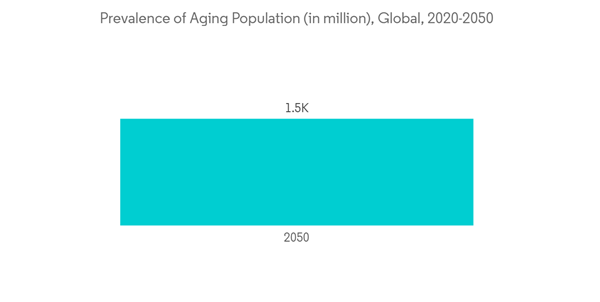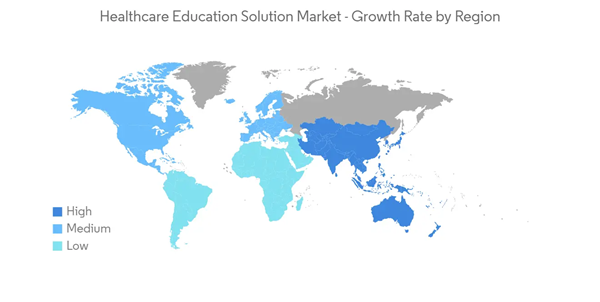Beyond reagent and supply limitations, the COVID-19 pandemic is having a severe impact on infectious disease detection and clinical laboratory operations. Due to the increased workload, laboratories were required to mobilize personnel and resources to support SARS-CoV-2 testing, which hampered diagnostic testing of other infectious diseases of public health concern, such as STIs and healthcare-associated infections (HAIs). Various research articles and studies have been published to understand the impact of COVID on healthcare training and education. For instance, in April 2021, a research article published by HealthStream titled "Best Practices for Healthcare Training During the COVID-19 Pandemic" stated that there also is a widening gap between nurses with less experience and patients whose conditions are far more complex. To close this gap, organizations need to teach novice nurses more effectively, change onboarding, and transition them to competency more quickly.
Factors such as increasing diseases, product launches, and other initiatives by key market players are likely to boost the market. The burden of infectious diseases across the world is increasing, which is resulting in the rising focus on diagnosis and treatment of the same. According to the Center for Disease Control and Prevention (CDC), in March 2022, the number of new tuberculosis cases found in the United States was around 7,860, a a rate of 2.4 per 100,000 persons in 2021. Thus, the high prevalence rate of people with tuberculosis surges the demand for its diagnosis, thereby driving the market. According to the CDC article published in February 2022, Salmonella bacteria causes about 1.35 million infections, 26,500 hospitalizations, and 420 deaths in the United States every year. A high number of infectious diseases every year creates a burden on the healthcare system in the country. Hence, the created burden could be minimized by the implementation of awareness programs and providing education related to the prevention and treatment of the diseases. For instance, the World Antimicrobial Awareness Week (WAAW) is celebrated annually, which aims to increase awareness of global antimicrobial resistance and to encourage best practices among the general public, health workers and policy makers to avoid the further emergence and spread of drug-resistant infections. Therefore, the increase in awareness of infection would result in the implementation of healthcare education that may boost the market studied.
Initiatives by key market players, such as product launches, acquisitions, etc., are expected to increase the market growth. For instance, in January 2021, Olympus Corporation launched a new comprehensive educational platform designed to provide healthcare professionals (HCPs) all over the world. Furthermore, in April 2020, Learning solutions company eLearning Brothers acquired Trivantis and Edulence. The acquisition of Trivantis and Edulence provided a learning ecosystem for professionals worldwide.
Hence, due to the abovementioned factors, the market is expected to grow in the future.
Healthcare Education Solution Market Trends
Cardiology is Expected to Hold a Significant Market Share Over the Forecast Period
Factors such as the rising incidence of cardiovascular diseases (CVD), advancements in technology, and online courses are expected to increase the demand for educational solutions. As per the 2021 update by the World Health Organization (WHO), CVDs include coronary heart disease, cerebrovascular disease, rheumatic heart disease, and other conditions. The same source also reports that cardiovascular diseases (CVDs) are the leading cause of death globally, and an estimated 17.9 million people died from CVDs in 2019, representing 32% of all global deaths. Of these deaths, 85% were due to heart attack and stroke. In addition, the above-mentioned source also reports that out of the 17 million premature deaths (under the age of 70) due to noncommunicable diseases in 2019, 38% were caused by CVDs and more than three-quarters of CVDs deaths take place in low- and middle-income countries. Increasing CVD burdens could be minimized by providing healthcare educational campaigns to the public. This would minimize the burden and increase the efficiency of the system. Thus, an increasing patient pool of cardiovascular diseases (CVDs) is one of the prime factors augmenting the growth of the market.Technological breakthroughs, particularly in devices, are changing the course of heart failure (HF) management. The focus on developing technologically advanced products is significantly increasing with the introduction of accessible and novel technologies that are driving a growth factor for healthcare educational solutions. For instance, in February 2022, CDC published an awareness campaign titled "American Heart Month Toolkits 2022". Under this campaign, it declared February as American Heart Month. In this campaign, the CDC provided necessary education to both health care professionals and community partners by providing them with necessary toolkits related to the solutions for CVDs. Such an educational campaign would increase the market growth in the upcoming period.
Similarly, new product launches also require more educational support for proper utilization. For instance, in January 2020, Medtronic PLC received approval from the United States Food and Drug Administration (FDA) for Micra AV, the world's smallest pacemaker with atrioventricular (AV) synchrony. Micra AV is indicated for the treatment of patients with atrioventricular (AV) block, a condition in which the electrical signals between the chambers of the heart (the atria and the ventricle) are impaired. Several recent advancements in implantable cardioverter-defibrillator (ICD) technology to extend battery life, improvements in patient monitoring to avoid needless shocks, and the introduction of quadripolar lead devices to improve device programming and to improve therapy effectiveness have been taking place in recent years. Furthermore, in October 2020, Abbott introduced its new implantable cardioverter-defibrillator (ICD) and cardiac resynchronization therapy defibrillator (CRT-D) devices. Such new innovations would require better education for the implementation as new technology requires learning by the healthcare professionals so that it can be explained to the public and patients. Hence, increasing innovative product launches will increase the market growth, increasing CVDs and advancements in technology demand healthcare educational solutions due to increasing complexity.
North America is Expected to Dominate the Market Over the Forecast Period
Factors such as increasing disease, investments, and product launches are expected to increase market growth. According to Cancer Statistics 2021, published in the American Cancer Society Journal, there are an estimated 1.9 million new cancer cases diagnosed and 608,570 cancer deaths in the United States, which will drive the market significantly.According to the Centres for Disease Control and Prevention (CDC), in September 2020, heart disease was the leading cause of death in the United States. Every year about 805,000 Americans have heart attacks. As the number of deaths due to heart diseases is increasing, there is a continuous need for the proper detection and diagnosis of cardiac diseases and hence are expected to show growth over the forecast period. The increasing burden of cancer and CVDs would require more innovative care support by healthcare professionals. However, new treatments often use complex, innovative technologies for which training and education are required. Hence, increasing the burden of such diseases would also increase the demand for healthcare education solutions. In addition, the high prevalence of chronic diseases like asthma, diabetes, and heart diseases will also boost the market.
According to the Centers for Disease Control and Prevention (CDC)'s Article titled 'Heart Disease Facts,' updated in February 2022, Heart disease is one of the leading causes of death in the United States. The same source also reports that every year about 659,000 Americans have a heart attack, thus significantly impacting the market growth. Furthermore, for instance, in February 2022, Researchers from Harvard University engineered a school of fish that uses the contractions of human heart cells to swim autonomously. This experiment could advance pacemaker technology and improve the development of artificial hearts for humans. Such innovative technological advancements will require healthcare professionals to get used to. Additionally, these advancements also require proper education and training on how to use them with the existing technologies and methods. Hence, the increasing technological advancements would increase the demand for the healthcare education solutions market in the upcoming period.
Furthermore, the increasing investment by the private players is also boosting the growth of the market. For Instance, in June 2021, Synchron, a brain interface platform company, received funding of USD 40 million in a Series B round of financing led by Silicon Valley venture capital firm Khosla Ventures for the launch of the United States Clinical Trials of Minimally Invasive Brain-Computer Interface. Additionally, in July 2021, the company received approval from the United States Food and Drug Administration for the conduction of clinical trials in humans in the United States. As the technology is new, there will be a requirement for the training of such technologies. Thus, such product innovations in the concerned market will drive the growth of the market studied.
Thus, owing to the above-mentioned factors, the studied market is expected to show growth over the forecast period.
Healthcare Education Solution Industry Overview
The market is partially fragmented and consists of several major players. Some of the companies currently dominating the market are Stryker, GE Healthcare, Medtronic, Siemens Healthineers, and FUJIFILM Holdings, among others.Additional Benefits:
- The market estimate (ME) sheet in Excel format
- 3 months of analyst support
This product will be delivered within 2 business days.
Table of Contents
Companies Mentioned (Partial List)
A selection of companies mentioned in this report includes, but is not limited to:
- CANON MEDICAL SYSTEMS CORPORATION
- Coursera Inc
- Elsevier
- FUJIFILM Holdings
- GE Healthcare
- Koninklijke Philips N.V
- Medtronic
- Olympus Corporation
- Siemens Healthineers
- Stryker
- SYMPLR
- Zimmer Biomet










